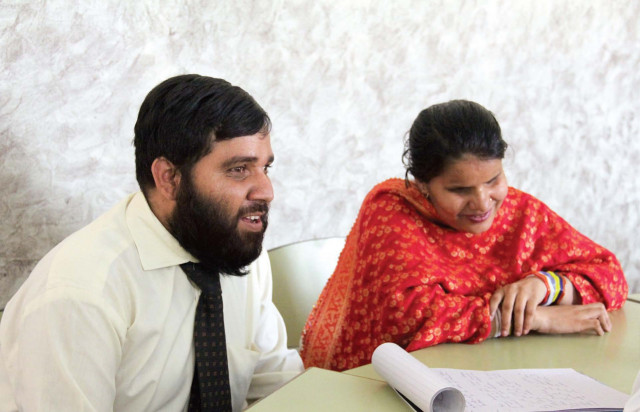Special achievements: Visually-challenged students disheartened by no appreciation
Ansari and Afsar have not even received a congratulatory phone call from their department.

For Shahid Ansari and Ameenat Asfar, dejection has taken its due course. One month after another, they wait for any sort of appreciation for their remarkable accomplishment.
Both Ansari and Afsar cannot see but yet they bagged first and second positions in Masters’ in Urdu exams last year.
But since the result was announced by Karachi University (KU) in the middle of April, Ansari and Afsar have not even received a congratulatory phone call from KU’s department of special education. “We proved ourselves... What remains to be seen now is how the society reacts to our achievement,” said Asfar. “Off and on, we listen to social organisations and government officials calling for the creation of an all-inclusive society.”
Ansari said, “We have received education and we also performed really well. But the absence of any appreciation has mellowed down our high hopes for a good future.”
“I have fought hard to find out how to do things which everyone expected me to do. But no one ever bothered showing me how to do them because they weren’t trained to do so.” Ansari wants the government to give them a stipend so that they become financially secure. “We want to serve the country with the same distinction that we have achieved in education,” he said. “And we strongly believe that we have got the ability to do this.”
Ansari and Asfar both studied together at Ida Rieu school. They first met each other when they were in grade five. Asfar’s parents moved to Karachi from Khairpur in 1995 so that their children might have access to better education. Asfar has three other siblings who are also visually-challenged.
“When I came to Ida Rieu I did not even know how to speak properly,” she said. Memories of the difficult time of Asfar’s life make her weep uncontrollably as she shares her story with The Express Tribune. “I used to think that the world was a bad place. The people were black and the world wore different shades of it.”
But Asfar kept trying. She improved so much that she cleared two grades in one year. She later married a man who shares her disability with her but has been her pillar of support. “When I used to prepare for exams he used to get ready-made food from outside and did not let me to do any household chores,” she said.
Studying for her masters was no easy task, especially at post-graduation level where Ansari and Asfar were competing with so-called “abler ones”. Their mentors recorded notes on cassette tapes for them and this is how they learnt their subjects. While talking to The Express Tribune, Ida Rieu’s principal, Qudsia Khan, pointed out that Asfar got the second position in Masters’ in Urdu despite the fact that it was not her mother tongue.
The harder task was however, finding writers who can write their answers for them at the exam. It is only this April that the Board of Intermediate education allowed visually-challenged students were allowed to write their own answers in Braille. Otherwise, the university requires that the students bring a writer with them who can write the answers for them.
Ansari was able to find an intermediate student. “I was worried whether he will be able to write well but I’m grateful to him that he put in all his effort and neglected the pain in his fingers.”
Asfar’s friend, Ansari, who lives in Orangi Town, got his moral support from his elder brother, who helps and encourages him to keep fighting. “I used to think that I’m the only person in the whole world who cannot go outside to play like the other children used to do,” said Ansari. “School helped me understand my disability and inculcated the thirst for knowledge within me.”
Although the government allocates two per cent seats for jobs in government institutions for people with special needs. But despite repeated clarifications by the federal and provincial governments the people do not seem to be getting the benefits allowed to them. “When someone who is physically-handicapped or visually-challenged applies for a job in any government institution, he or she is refused with the reason that there are no jobs available for them.”
Published In The Express Tribune, June 13th, 2012.


















COMMENTS
Comments are moderated and generally will be posted if they are on-topic and not abusive.
For more information, please see our Comments FAQ